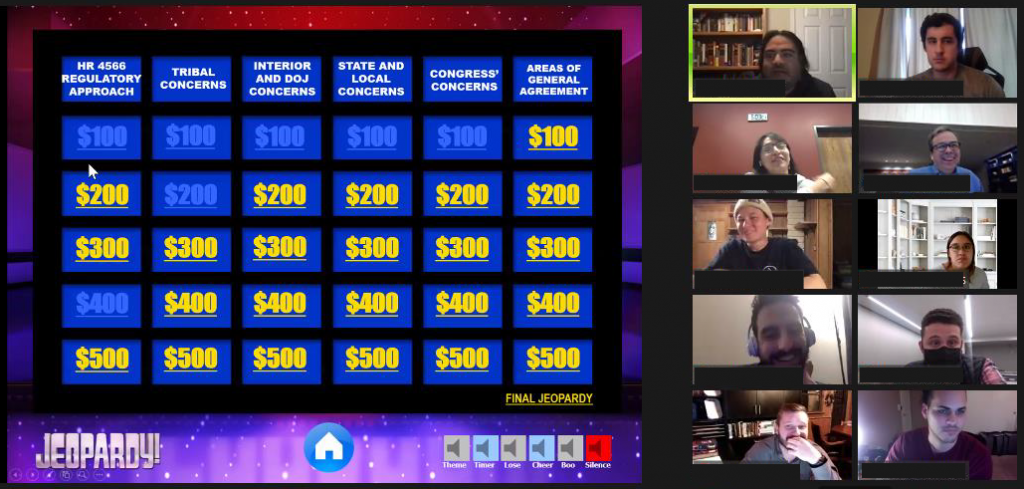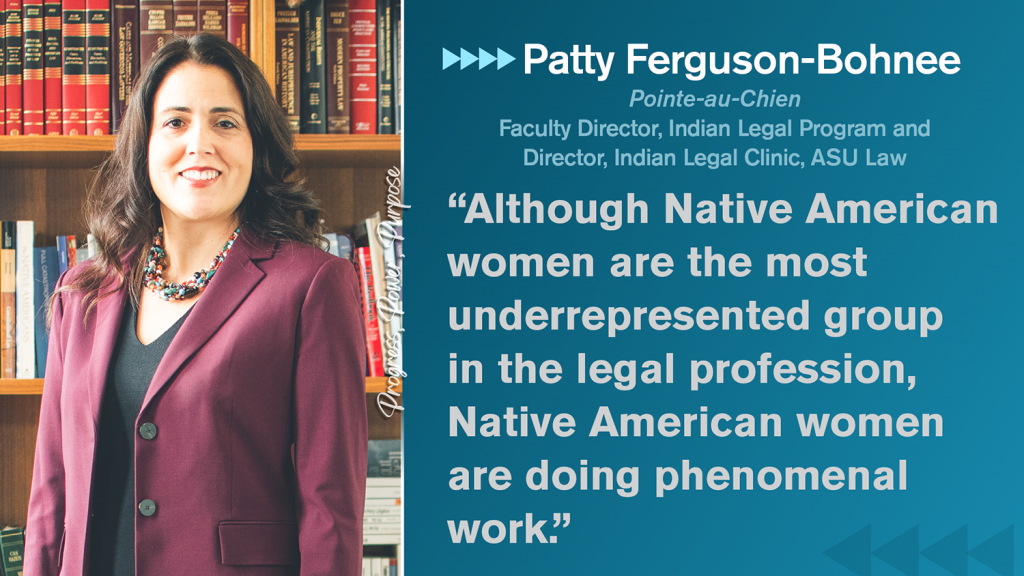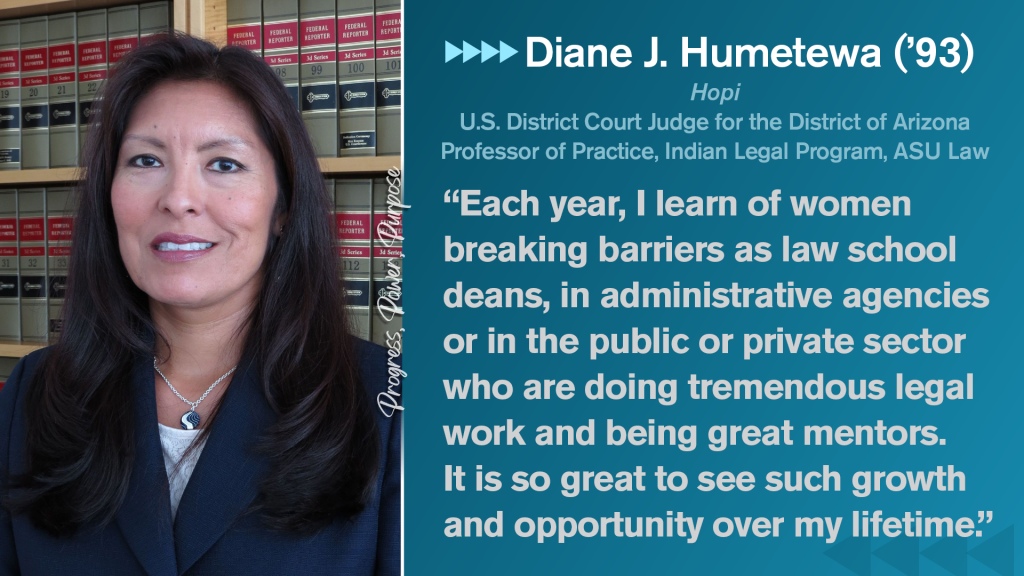Category Archives: Professors
ILP Family legacy
Native American Heritage Month
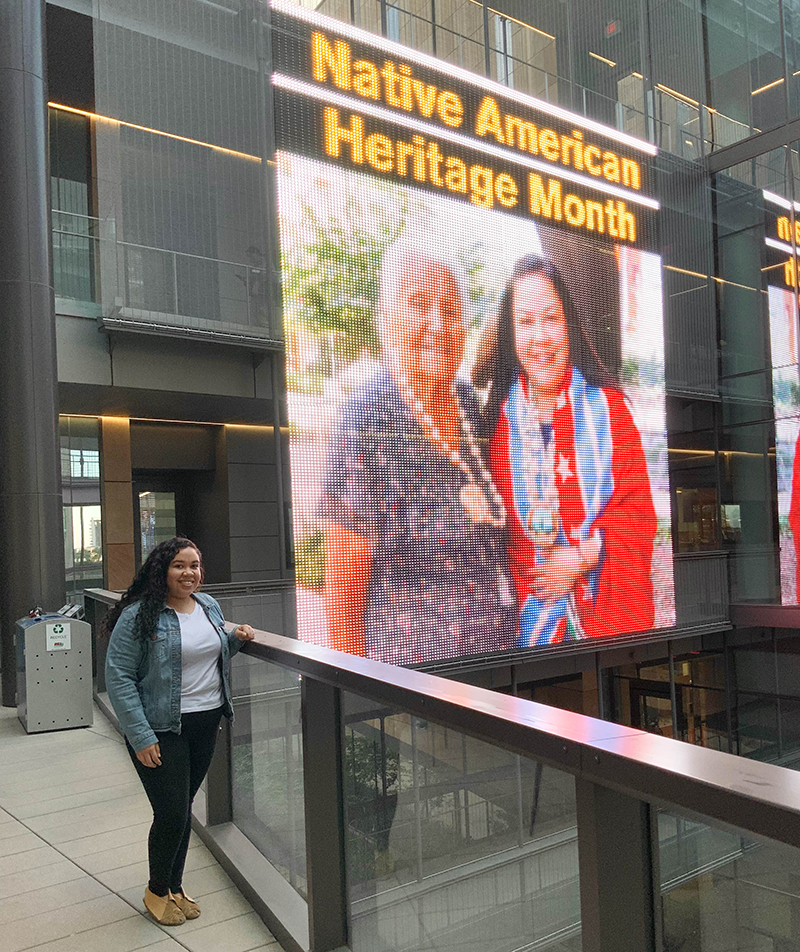
As a team representing 10 tribes at the Sandra Day O’Connor College of Law, the Indian Legal Program aims to educate and celebrate on the ancestral lands of the Akimel O’odham. The program was established 33 years ago by the efforts of two ASU Law students – Gloria Kindig (’89) and LynDee Wells (’89). Over the years, we have excelled and built on that vision and created the Indian Legal Clinic, the Arizona Native Vote Election Protection Project, the Indian Wills Clinic, the Pathway to Law Initiative, the Rosette LLP American Indian Economic Development Program, and the Indian Gaming and Tribal Self-Governance programs.
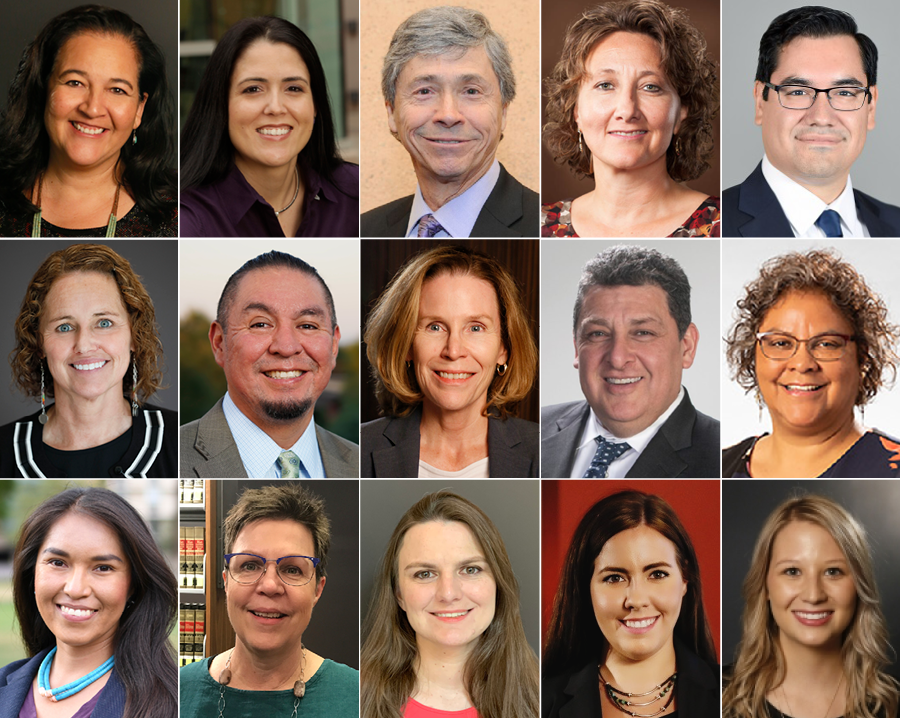
- Kate Rosier (Comanche), ILP Executive Director and Assistant Dean of Institutional Progress
- Patty Ferguson-Bohnee (Pointe-au-Chien), ILP Faculty Director and Indian Legal Clinic Director
- Professor Robert Miller (Eastern Shawnee), Willard H. Pedrick Distinguished Research Scholar and Director of the Rosette LLP American Indian Economic Development Program
- Professor Stacy Leeds (Cherokee), Foundation Professor of Law and Leadership
- Professor Trevor Reed (Hopi), Associate Professor of Law
- Professor Ann Marie Bledsoe Downes (’94) (Winnebago Tribe of Nebraska), Professor of Practice and Director of the Indian Gaming and Tribal Self-Governance Programs
- Professor Derrick Beetso (’10) (Navajo), Director of the Indian Gaming and Tribal Self-Governance Programs
- Professor Helen Burtis (’07), Faculty Associate
- Professor Lance Morgan (Winnebago Tribe of Nebraska), Faculty Associate
- Professor Pilar Thomas (Pascua Yaqui Tribe of Arizona), Faculty Associate
- Danielle Williams (Navajo), Program Coordinator Sr
- Theresa Beaulieu (Stockbridge-Munsee), Program Coordinator
- Honore Callingham (’18), Senior Specialist, Indian Legal Clinic
- Torey Dolan (’19) (Choctaw Nation of Oklahoma), Native Vote Policy Fellow, Indian Legal Clinic
- Blair Tarman (’21) (Chickasaw), Native Vote Policy Fellow, Indian Legal Clinic
In addition to the JD program, we also offer a Master of Laws (LLM) program and Master of Legal Studies (MLS) program.

- Paul Spruhan, Faculty Associate
- Jay Spaan (Cherokee), Faculty Associate
- Michael Hoenig, Faculty Associate
We’ve expanded our presence in Nebraska, California and Washington, D.C. We are a growing network because law is a growing field. Over 375 ILP students have graduated from ASU Law and over 150 received a certificate in Indian Law.
Today, we are proud to have 72 students representing 36 tribes: 44 JD, 1 LLM and 27 MLS.
To our entire ILP family: Happy Native American Heritage Month!
Professor Miller and the McGirt case
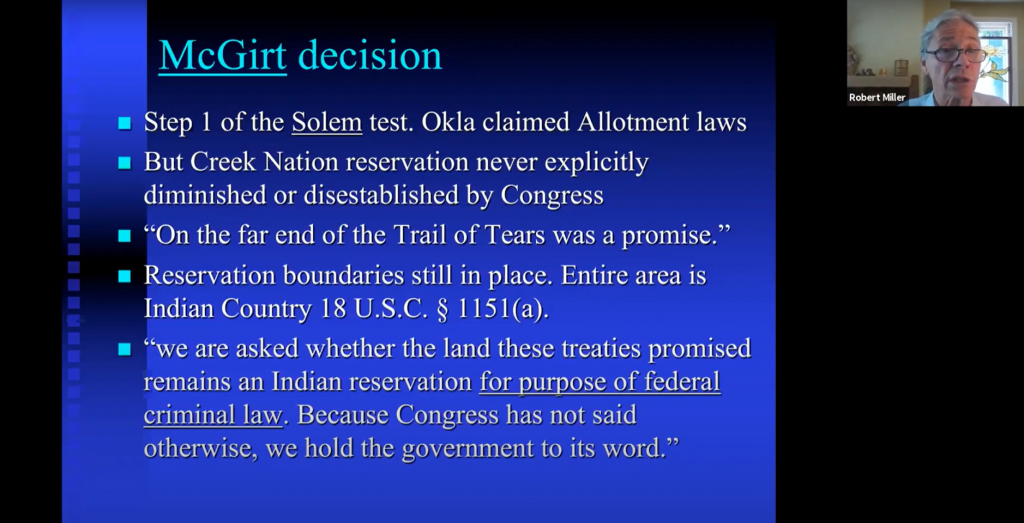
It’s almost been a year since the Supreme Court issued its decision in McGirt v. Oklahoma on July 9, 2020 and affirmed that the Muscogee Creek Nation’s reservation was never disestablished. The majority opinion strongly affirmed what Native people have known: Treaty rights are the Supreme Law of the land and do not fade with time. This historic decision created dialogue and research for Indian Country, especially for Federal Indian Law experts like Professor Robert J. Miller. It’s been “all McGirt, all the time,” he says.
2020
On July 12, 2020 Professor Miller was quoted in the Arizona Republic article on the McGirt case. Read article here.
On July 14, Professor Miller along with Professor Larry Roberts, presented on McGirt case to the ILP students.
On July 23, the Indian Legal Program at the Sandra Day O’Connor College of Law at ASU hosted, “The Most Significant Indian law Case of the Century: McGirt v. Oklahoma,” webinar that offered an in-depth case overview, ” which included presenters: Professor Miller, Professor Stacy Leeds, Derrick Beetso (’10), Ambassador, Muscogee Creek Nation Ambassador Jonodev Chaudhuri and moderated by Professor Roberts. View the recording here.
On July 30, Professor Miller gave a two-hour Indian law training for the U.S. DOE Bonneville Power Administration and discussed McGirt case at length.
In July, Professor Miller stated, “The Court is upholding this 1832 treaty that the Creek Nation signed with the United States, and is holding the United States to those promises” during his interview with the Voice of America (VOA) News. Watch full video here.
Professor Miller also presented, “McGirt v. Oklahoma: Understanding the Decision and its Implications for Indian Country” for the Oregon Historical Society. Watch Miller’s presentation here.
On August 4, Professor Miller co-presented a McGirt webinar for the American Indian Community House in New York City.
On August 31, Professor Miller presented on his upcoming paper “The Indian Law Bombshell: McGirt v. Oklahoma” to law school faculty. Co-author Native Vote Fellow Torey Dolan (’19) joined the discussion. Miller and Dolan published their law review draft article, “The Indian Law Bombshell: McGirt v. Oklahoma” in the SSRN. Read the draft article here.
Professor Miller drafted an 800-word blurb on the McGirt decision for the American Association of Law Schools’ (AALS) Indigenous Nations section newsletter.
On September 15, Professor Miller was a guest on the daily radio program Native America Calling to speak about the McGirt case. Listen here.
On September 17, Professor Miller was a panelist on a 90-minute Zoom conference for the Northeast Corporate Counsel Organization Diversity & Equity Committee and he spoke about the McGirt decision and its impact on corporate clients in Oklahoma.
On October 26, Professor Miller spoke on a panel session about McGirt for Boston College Law School.
On November 4, Professor Miller gave a keynote speech on McGirt for the “American Society for Ethnohistory Annual Conference” at University of North Carolina.
On November 13, Professor Miller participated in the Oregon State Bar CLE panel and discussed the McGirt case.
On November 19, Professor Miller presented a one-hour speech for the American Philosophical Society on the McGirt case. Watch the recording here.
On December 11, Professor Miller gave a presentation on his current research on the landmark Supreme Court decision in McGirt v. Oklahoma for ASU’s Indigenous Research Roundtable (IRR).
2021
On Febuary 26, 2021, Professor Miller and Dean Elizabeth Kronk-Warner gave a luncheon talk on McGirt at the George Washington School of Law.
Professor Miller and Professor Robbie Ethridge from University of Mississippi signed a contract to write a book on McGirt for the University of Oklahoma Press.
In April, Professor Miller and Torey Dolan (’19) published their law review draft article, “The Indian Law Bombshell: McGirt v. Oklahoma” in the SSRN. Read the draft article here.
Professor Miller published two short essays for the University of Pennsylvania School of Law’s Regulatory Review journal on the McGirt case and private sector economic development on reservations.
Professor Miller published the 5,500 word cover article “McGirt v. Oklahoma: The Indian Law Bombshell.” in the April edition of the Federal Lawyer magazine for the Federal Bar Association.
Professor Miller and Torey Dolan (’19) accepted an offer to publish their article “The Indian Law Bombshell: McGirt v. Oklahoma” in 101 Boston University Law Review (2021).
Impacting the next gen
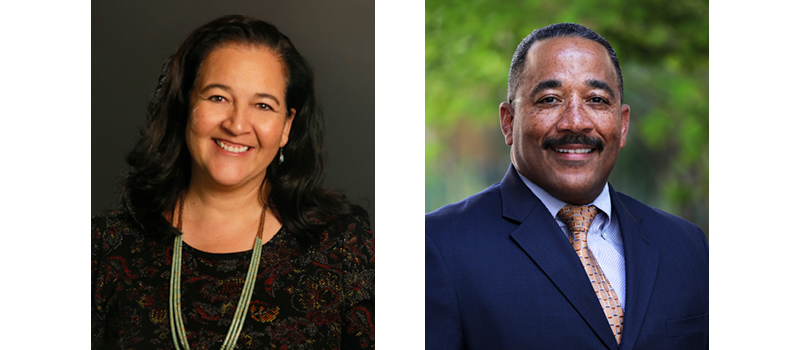
This past semester ILP Executive Director and Assistant Dean of Institutional Progress Kate Rosier and Assistant Dean Ray English of ASU Law’s Office of Career and Employment Service joined forces to co-teach an undergraduate course LAW 394: Law School Foundations. The course was created to provide students with the opportunity to explore and develop the skills necessary to apply to law school and succeed in law school. This diverse roster took part in an intensive LSAT preparation course, and students learned about the law school application process and application strategies. They were also given the opportunity to network with law school administrators, law students, lawyers and judges.
“I feel like the course provided students with a great foundation upon which to develop their critical thinking skills and to pursue admission into law school,” said English. “My favorite memories surround oral arguments. Students did amazingly well, considering many had never made an oral argument before.”
Over the course of the semester, the students were exposed to legal constructions of the courts in the United States and Arizona, including the function of courts and judges. Students participated in legal analysis exercises, draft legal memorandums and made oral arguments.
“It was a rewarding experience to work with talented and motivated students in the class,” said Rosier. “It was fun to demystify the law school admissions process and direct them with helpful tips.”
The course was initially designed to be in-person but due to a global pandemic, Rosier and English quickly took action and reworked the course to meet the needs of the students. By the end of the semester, they realized the course exceeded their expectations. “Kate and I make a great team! I am looking forward to working with her to improve the course.”
“I think the biggest accomplishment is that all of the students attended every session, even though I made everyone turn on their cameras,” he said. By the end of the semester, two students secured summer internships with Honorable David B. Gass of the Arizona Court of Appeals, Division One.
This course was based on the course previously taught by Jeremiah Chin (’15) and Dr. Bryan Brayboy. We appreciate their great work and forward thinking.
Make learning Indian Gaming Law fun
This semester, Professor Larry Roberts brought game to his Indian Gaming Law class! In a public health crisis, students turned on their webcams and tuned into class at 3:45 p.m. every Tuesday to learn about Indian Gaming Law from Professor Roberts, who tuned in from Washington, D.C. The class examined the historical background behind Indian gaming and the modern legal regime that governs the development of gaming enterprises in Indian country.
To make it interesting and get the students excited about learning, Professor Roberts challenged his class to Jeopardy and Family Feud. Student teams applied their knowledge and reviewed Indian gaming regulatory history while playing Jeopardy and a fast game of Family Feud.
Jeopardy was neck and neck until the very end. Team 1’s Peter Furlow (2L) and Team 2’s Zaine Ristau (2L) faced off in final jeopardy. Team 1 won Jeopardy by the narrowest of margins: one dollar. Pro tip for those who haven’t played Indian Gaming Jeopardy: if you don’t know the answer, go with “What is the Secretary of the Interior?”
The class ran through two lightening rounds of Family Feud, reviewing the components of HR 1920 and dissenting views of HR 1920; the game ended in a tie. But the class wasn’t all games, they continued on to discuss the Indian Gaming Regulatory Act and its legislative history.
____
Theresa Beaulieu
Program Coordinator, Indian Legal Program, ASU Law
Danielle Williams
Program Coordinator Sr, Indian Legal Program, ASU Law
Indigenous Research Roundtable
Connecting Indigenous Scholars across ASU
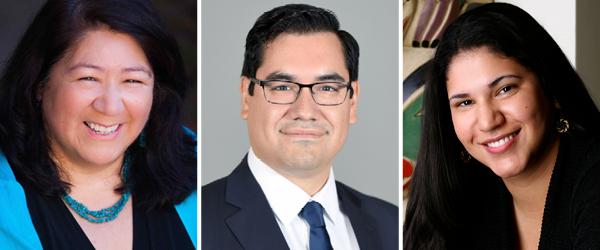
For several years now, ASU’s Indigenous Research Roundtable (IRR) has connected Indigenous scholars and allies through a monthly seminar featuring new, cutting-edge scholarship conducted with, by and for Indigenous communities. The IRR was originally organized by Dr. Angela Gonzales from ASU’s School of Social Transformation and hosted at Tempe campus. As the ASU Downtown campus has grown to include numerous ASU colleges, schools and programs serving Indian Country—including Social Work, Journalism, Health Sciences, Law and many others—the IRR is, for the first time, being hosted by two downtown campus Indigenous faculty, ASU Law Professor Trevor Reed and School of Social Work Professor Felicia Mitchell.
“As a new faculty member at ASU, IRR provided me opportunities to meet and connect with Indigenous scholars and allies across ASU,” said Professor Mitchell. “The IRR has also been a supportive space to highlight the important work my colleagues and I are involved in throughout Indian Country.”

In the fall semester, the IRR featured two thought-provoking presentations showcasing the diversity of Indigenous research happening at ASU. On Nov. 4, Professors David Manuel-Navarrete and Tod D. Swanson shared their experiences establishing a new field school in partnership with Tribes in the Ecuadorian Amazon. The field school educates university students from around the world about Kichwa approaches to climate science and biodiversity while also providing a stream of sustainable income for Kichwa peoples. On Dec. 9, Professor Matt Ignacio presented the results of his groundbreaking study of harm-reduction interventions aimed at Indigenous youth who may be at risk for alcohol and other drug use. Then on Jan. 27, School of Social Work Professor Shanondora Billiot shared her research on the effects of land-based healing programs on the mental health and wellbeing of Indigenous communities in Louisiana. Ending the roundtable sessions for the academic year, Professor Robert J. Miller presented his current research on the landmark Supreme Court decision in McGirt v. Oklahoma on March 24.
For more information about the Indigenous Research Roundtable or to participate in a roundtable next year, please contact Professor Reed at t.reed@asu.edu.
“Cultural Misappropriation” – Professor Reed 3/31
Professor Trevor Reed is giving a presentation on Wednesday, March 31 at 5:30-7:30pm EST for Intellectual Property Law Association on “Cultural Misappropriation.”
Register for free to join.
About the program: What is cultural misappropriation and why does it matter? Tune in for a conversation between legal experts and activists covering Copyright and Trademark issues of cultural misappropriation such as the Washington pro football team (Harjo v. Pro Football and its relationship with Matal v. Tam), fashion (Urban Outfitters v. Navajo), photography and music on reservations, and traditional knowledge labeling
Progress, Power, Purpose: Helen Burtis (’07)
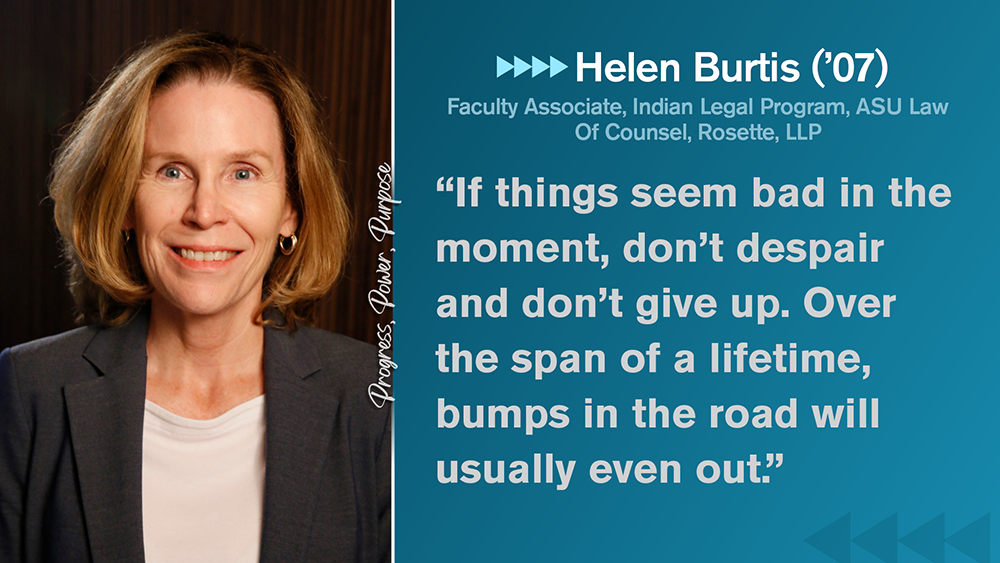
Women's History Month
In celebrating “Women’s History Month,” we turned to some of the women of the ILP to shed light on women legal professionals and advocates in this Progress, Power, Purpose series. Another wise woman who has been instrumental to the Indian Legal Program, Faculty Associate at ASU Law and ILP alum Helen Burtis is expanding the ILP vision. Community partnerships and preparing student attorneys are important to the Indian Legal Clinic and Helen works to harness the civic power of the Indian Wills Clinic. Despite the global pandemic crisis, the Indian Wills Clinic continued its service and held virtual sessions working with tribal members to discuss estate planning needs for the Pechanga Wills Clinic last semester and Quechan Wills Clinic just last week.
Q: What does your position entail?
A: As a Faculty Associate, I teach various Indian law classes and do some program work, including organizing the bi-annual Tribal Court Trial Skills College and also creating new on-line Indian Law courses.
Q: Were you always interested in this kind of work?
A: The law is a second career for me. I spent the first half of my professional life working in the financial services sector, predominantly as an executive for a Fortune 500 insurance carrier. I decided to go into the law because I didn’t want to work my entire life in only one field plus I found legal work, especially Indian law, very interesting.
Q: What advice do you have for Native American women who want to work in this area?
A: As you’re figuring out what you want to do with your career, try not to exaggerate in your mind the importance of any one decision. There are only a few decision in life that take you down a path you can’t later deviate from. If you find something you’re interested in, give it a try. If it turns out to be your dream job, fantastic! If your interest later turns in another direction, you can always pursue that new avenue.
Q: What is your proudest career moment?
A: My proudest moments are when I see ILP students in action, such as Indian Legal Clinic student attorneys drafting wills for Native American landowners. What I feel is a special joy from seeing them reaching their potential in a way that benefits individual tribal citizens and tribal communities.
Q: Is there anything you’ve learned after graduating that you wished you learned in class?
A: My professors at the Sandra Day O’Connor College of Law and the ILP really did great jobs of preparing me to practice. My time in the Indian Legal Clinic and also the two week summer-session Intensive Writing course taught at that time were especially helpful.
Q: What is the most valuable lesson you learned in the classroom that has helped you in your career?
A: One of the most valuable lessor I learned was that fully understanding the other party’s position is a great way to be a better advocate for your client. One of my courses in law school was taught by a professor who had represented positions adverse to Indian County many times. Learning the law from their perspective, which was really from the “state’s” perspective, greatly advanced my understanding of why courts often decided cases against tribal interests and also how to create arguments to overcome those state-centered positions.
Q: What is your advice for current students?
A: If things seem bad in the moment, don’t despair and don’t give up. Over the span of a lifetime, bumps in the road will usually even out.
Q: Favorite law school memory.
A: When I was a student attorney in the Indian Legal Clinic, one of my clients won his motion to dismiss for lack of evidence. I was in class when we received the court’s order dismissing the charges against the client with prejudice, so the Clinic’s paralegal called him right away to give him the good news. He said he wanted me to call him when I got out of class because he would believe it when he heard it directly from his attorney. That made me feel legit.
Continue to Progress, Power, Purpose series.
________
Danielle Williams
Program Coordinator, Indian Legal Program, ASU Law
Progress, Power, Purpose: Patty Ferguson-Bohnee
Women's History Month
In celebrating “Women’s History Month,” we turned to some of the women of the ILP to shed light on Native women legal professionals and advocates in this Progress, Power, Purpose series. Indian Legal Program Faculty Director, Indian Legal Clinic Director and Professor of Law at ASU Law Patty Ferguson-Bohnee is of the Pointe-au-Chien tribe from Louisiana. In addition to teaching, this formidable force is most known for her continued work on the Arizona Native Vote Election Protection Project, which did Indian Country a great service in the 2020 presidential election, moving closer to a democracy that honors and values Native voters. While the pandemic was not an ideal circumstance, Native Vote took to digital media by storm with interviews, trainings, presentations, collaborations and most notably, the newly created Polling Locator Tool. Read more in Arizona Native Vote Changemakers.
When she’s not leading the charge in Native Vote, Patty is preparing students in her Indian Legal Clinic and promoting diversity and inclusion.
Q: What does your current position entail?
A: I serve as the Director of the Indian Legal Clinic and Faculty Director of the Indian Legal Program at the Sandra Day O’Connor College of Law at ASU. I am so blessed to be able to work with leading scholars and practitioners in Indian law and Tribal law and motivated students who really care about serving Indian Country. In the Indian Legal Clinic, the students practice under my bar license. We work on matters in tribal, state, federal, and international forums. The cases range from probate, family, criminal and civil litigation, voting rights, code drafting, environment, climate, and status clarification of tribes. My goal is that the students learn useful practical skills and develop a passion for service, while also serving unmet needs for Indian Country.
Q: Were you always interested in this kind of work?
A: I became interested in law when I participated in mock trial in high school. However, I became interested in Indian law as an undergraduate student. I was able to take a Federal Indian Law class as a freshman, and I never looked back.
Q: What advice do you have for Native American women who want to work in this area?
A: The sky is the limit! Although Native American women are the most underrepresented group in the legal profession, Native American women are doing phenomenal work. Keep in touch with your law school classmates and build a community of support. Join your local Native American Bar Association and the National Native American Bar Association.
Q: What is your proudest career moment?
A: Assisting Four Louisiana Tribes in securing state recognition.
Q: Is there anything you’ve learned after graduating law school that you wished you learned in class?
A: Many law students do not learn that there are three sovereigns—the state, the feds, and tribes. While this might not be harmful in some states, in the southwest, it could lead to malpractice. It also means that as Native lawyers and practitioners of tribal law and Federal Indian law, we are always teaching—the judges, opposing counsel, co-workers, clients, and others. At ASU, it is great to have Indian law professors teach first year courses so that they can provide this lens in which to analyze the law. It makes us all better attorneys and advocates. Everyone should learn Indian law basics because it transcends all areas of law.
Q: What is the most valuable lesson you learned in the classroom that has helped you in your career?
A: I took a few practical courses that served me well. One was environmental litigation, which included drafting briefs and an appellate argument. The other was mediation clinic, which taught me to listen and provided me tools to help resolve disagreements.
Q: Who are three Native American women law professionals and/or advocates who should be on our radar right now?
- Hilary Tompkins: a strong Native American woman, a leader, the first Native American to serve as the Solicitor of the Interior, and someone who has remained humble and genuine. She is expanding her knowledge base and using this an opportunity to rethink and reframe Indian law issues. She gave a thoughtful and powerful lecture at last year’s annual Canby Lecture, and I appreciated the time she spent with our students.
- Deb Haaland: If confirmed, Deb Haaland will be the first Native American ever appointed to a cabinet position. Her views on climate change are important to the future of Tribal communities, and the whole country.
- Doreen McPaul (’01): Doreen has served in numerous positions – academia, private law firms, tribal in-house counsel, counsel to tribal leadership, and now, Attorney General of the Navajo Nation. Through this journey, she has volunteered, served on numerous boards and bar leadership, speaks on numerous panels, and coordinates educational programs about Indian law and tribal law. She is also the president and founding board member of the Tribal In-House Counsel Association – a much needed forum to support tribal in-house attorneys and advocates.
Review Patty’s publications:
- Received the American Bar Association’s 2020 Spirit of Excellence award
- “How the Native American Vote Continues to be Suppressed” article published in the ABA Vol. 45, No. 1: Voting Rights.
- Co-authored with James Tucker article “Voting During a Pandemic Vote-By-Mail Challenges for Native Voters”
- “The History of Indian Voting Rights in Arizona: Overcoming Decades of Voter Suppression” SSRN article
- “The Impacts of Coastal Erosion on Tribal Cultural Heritage” article published in the SSRN.
Stay tuned for our next Progress, Power, Purpose series.
________
Danielle Williams
Program Coordinator, Indian Legal Program, ASU Law
Progress, Power, Purpose: Diane J. Humetewa (’93)
Women's History Month
In celebrating “Women’s History Month,” we turned to some of the women of the ILP to shed light on Native women legal professionals and advocates in this Progress, Power, Purpose series. The ILP Family, more specifically, the Native women student population has grown year-to-year and that is in no small part due to Native women representation like ILP alum, Professor of Practice at ASU Law and the U.S. District Court Judge for the District of Arizona, Honorable Diane Humetewa who is the first Native woman to serve on a federal district court.
Q: What does your current position entail?
A: I am a district court judge presiding over civil and criminal cases filed in federal district court.
Q: Were you always interested in this kind of work?
A: No. It was only after working in the federal court system as a victim’s advocate, and encouragement from attorneys in the U.S. Attorney’s office that I eventually applied to law school.
Q: What advice do you have for Native American women who want to work in this area?
A: If you want to be a litigator or eventually, a judge, find a way into court (city, state, federal, or tribal court). That is, by either practicing in a firm or office that enables you to file pleadings, or to appear in court, or to provide pro bono services in court. That is really the only way to learn the rules, processes and what the expectations of court practitioners are.
Q: What is your proudest career moment?
A: Watching Senator John McCain introduce my nomination to the Arizona district court on the floor of the United States Senate. Then watching the vote.
Q: Is there anything you’ve learned after graduating law school that you wished you learned in class?
A: That the study of law and actual practice of law are two different things.
Q: What is the most valuable lesson you learned in the classroom that has helped you in your career?
A: My opinions and experiences were just as valuable as everyone else’s. So, I should not hesitate to share them.
Q: Who are three Native American women law professionals and/or advocates who should be on our radar right now?
A: There are more than just three. Each year, I learn of women breaking barriers as law school deans, in administrative agencies or in the public or private sector who are doing tremendous legal work and being great mentors. It is so great to see such growth and opportunity over my lifetime.
Q: Your favorite law school memory.
A: Finding new and lasting friendships. Attending the fajita cook-off or going country dancing after a long school week. To this day, I count some of my 1L classmates as among my dearest friends.
Q: You are a Native American woman making history and have been the “first” in prominent areas throughout your career—first Native American woman federal judge, first Native American woman to serve as United States Attorney—Did you ever feel like the lone Native American voice in the room? How did you overcome those adversities? For that girl/woman who is finding her rhythm and trying to carve out a space to thrive, what advice would you give her?
A: I did feel alone because I was alone. That is, I was usually the only “Native” in the office, the courtroom, or seated at the conference table. For me, the only way to overcome the insecurities and the demands of such situations was to focus on the work at hand and to think about who may benefit from it.
The advice I would share is to be patient with yourself and with others. Law school teaches you how to “think” like a lawyer, but like everything else in life, you have to actually learn the law and practice it before you become proficient.
Review Honorable Humetewa’s publications:
- Judge Humetewa talks with Arizona PBS about “Native American women and the 19th Amendment“
- Featured in the ASU Law article “19th Amendment a historic milestone that continues to make huge impact.”
- Beloved ILP alum Judge Humetewa provided her inspiring address to the ILP graduating class of 2020.
- In her interview, Judge Humetewa recounts her fond memories of the late Senator McCain and talked with Arizona PBS.
Stay tuned for our next Progress, Power, Purpose series.
________
Danielle Williams
Program Coordinator, Indian Legal Program, ASU Law


